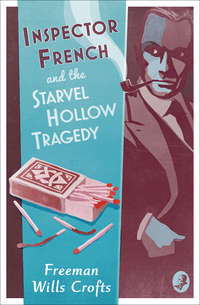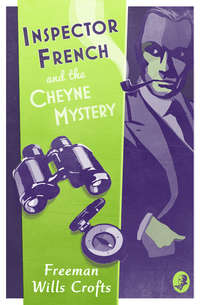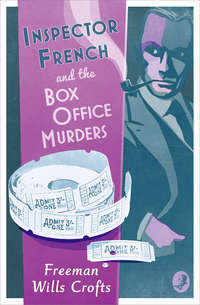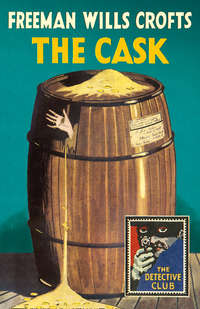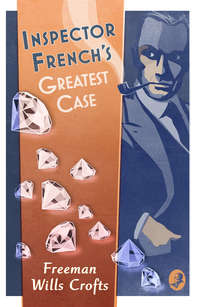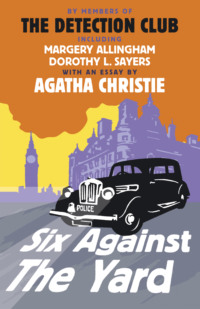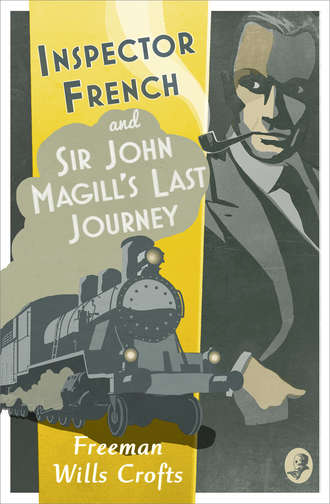
Полная версия
Inspector French: Sir John Magill’s Last Journey
The secretary was a somewhat striking-looking man of about five and thirty. Tall and spare without being actually thin, he gave the impression of extreme physical strength and fitness. His head was small, altogether out of proportion to his height. His face suggested a curious blend of the Red Indian and the Scandinavian; high cheekbones and ruggedly chiselled features combined with fair hair and the lightest of blue eyes. Energy, ambition and decision were written on every line of the man’s features. In fact before he opened his lips French realised that here was one who would get what he wanted or know the reason why.
‘I crossed over last night,’ he explained in answer to French’s question. ‘There was nothing to keep me in Belfast and things were getting behind here.’
‘I should be glad, Mr Breene, if you would tell me all you can about this unhappy affair. And first as to yourself. Have you been long with Sir John?’
‘Eight years. He appointed me private secretary while he was still running his mills in Belfast. When he gave them up and moved over here he asked would I care to remain with him as general confidential secretary and assistant. He made me a liberal offer and I accepted.’
‘You’re an Irishman yourself?’
‘A Belfast man. My brother and sister still live near Belfast.’
‘There can’t be much for a secretary to do here?’
‘There isn’t. It is simply that Sir John likes to amuse himself in his workshop and can’t be bothered with correspondence.’
French nodded and asked what sort of man Sir John was. He invariably repeated his questions to as many witnesses as possible in order to discount individual idiosyncrasies.
‘Well,’ Breene returned, ‘he is not what Americans call a good mixer. He is dry in manner and retiring in disposition and doesn’t make friends easily. And between ourselves, though I’ve no complaint to make, he is not particularly liberal about money. But when you’ve said that you’ve said everything. He is straight and honourable, and in his own way kindly. He is the type of man that the better you know him, the better you like him.’
‘Is he on quite good terms with all the other members of his family?’
French asked the question perfunctorily, but he watched keenly for Breene’s reaction. He was considerably interested by the result. Though the man said, ‘Oh, quite,’ without perceptible hesitation, French could have sworn it was with less conviction. He thought quickly. If, as Miss Magill said, Malcolm had suffered losses during the linen depression, if the old man was not liberal about money, if Malcolm was to a considerable extent his heir … Added to all that curious business at Whitehead … French decided to bluff.
‘I rather gathered,’ he said, with a sidelong glance and bending forward confidentially, ‘that relations between Sir John and his son were just a trifle strained?’
‘An exaggeration,’ Breene answered promptly. ‘Admittedly they didn’t see eye to eye about money matters. But to say that relations were strained is untrue.’
French chuckled inwardly as he bluffed again.
‘Probably you are right. It was this money question that I had in mind all the same. I wish you’d explain just what took place about it.’
‘There’s no mystery about that,’ Breene declared. ‘Major Magill, as you doubtless know, was in difficulties in connection with his business. Linen has been having a bad time in Ireland lately and more than one old and respected firm has gone down. As far as I understood it, the major was faced with having to close down, which of course he didn’t want to do. He wrote asking Sir John to put some more capital into the concern, so that he might install some new and more efficient machinery. But Sir John wouldn’t. He took the line that when he was in charge he had had to meet difficulties and that the major could do the same. It was not perhaps very reasonable, as the slump was due to conditions the major had very little control over; mostly it was the result of the War. But there it was. Sir John wouldn’t move. The major came over to see him a couple of times, but it was no good. But they were perfectly friendly and all that, for I saw them together.’
‘Quite,’ French agreed. ‘I suppose you cannot tell me where I could find Sir John’s will?’
‘I don’t even know if he made a will, though I suppose he must have.’
‘What does he keep in the safe? Can you open it for me?’
‘No. Sorry I can’t help you there either. Sir John keeps the key himself and only on one occasion did I see inside. It seemed to contain only papers, but there may have been objects of his collection too valuable to leave unprotected.’
It suddenly occurred to French that here was rather a serious difficulty. Though he had not actually gone the length of formulating the words, ‘The Case Against Malcolm Magill,’ he realised that the formulation on such a phrase was by no means an impossibility. From the information gained in Ireland Malcolm was a priori the most likely person to have disposed of Sir John’s body, and now here seemed the beginnings of a theory of motive. For to Malcolm’s unprosperous condition must be added the fact that he stood to gain by his father’s death.
French pulled himself up sharply. This would never do. Cases were not conducted in such a way, at least not successful cases. Let him get his facts before jumping to conclusions. At the same time … He turned to Breene.
‘I understand that Sir John went to Ireland about some invention?’
Breene agreed. Sir John was always working out some idea. He was very ingenious and worked as if brought up to the trade.
French nodded.
‘Do you happen to know the exact nature of this Belfast business?’
Breene took out a cigarette case and automatically selected a cigarette, as an afterthought handing the case to his companion.
‘To a limited extent only,’ he answered. ‘Sir John warned me to say nothing about it, but I suppose I’m free from that now. Not that it seems of any importance.’ He twirled his flint and held out the lighter. ‘For some years Sir John has been working on one invention which really would be valuable if he could bring it off. He has been trying to find an improved way of combining artificial silk with the finest linen. He thinks it might be possible to produce a fabric which would be as light and smooth as silk, while strong and uncreasing and giving good wear. He believes such a fabric, if cheap enough, would supersede both real and artificial silk. A jolly fine idea, if he could only do it. There’d be an immense future for such a product. Incidentally it would set the Ulster linen trade on its feet again, make it boom, in fact.’
‘Incidentally also it would make the inventor a millionaire—if he handled his cards well.’
‘Quite. Well, Sir John had found a name for his new product; he was going to call it “Sillin,” a portmanteau of “silk” and “linen,” you understand. But unfortunately that was all he had found. The product itself eluded him. His visit to Belfast was in connection with it.’
‘Just how, can you tell me?’
‘I can’t. He told me he was going to see an engineer in Belfast about it and as he might want to enter into an agreement with him he would like me to go over to take the necessary notes. Also he said something about a possible patent. It looked to me as if either he or the engineer thought they had solved the thing, though he did not say so.’
In answer to French’s questions Breene repeated the story M’Clung had already told. He, Breene, had crossed via Liverpool, gone out on arrival to his brother’s at Comber, breakfasted and returned to Belfast in time to be at the Grand Central Hotel at half past ten, the hour at which he was to meet Sir John. There all that day and night he had waited fruitlessly for the old man. Next morning he had determined to go up and see Major Magill at the mills, but just as he was about to leave the hotel the major had entered. Since then he had made a statement to the Belfast police, and after consulting the major, had returned to London.
‘I suppose, Mr Breene, you have no idea who Sir John had the appointment with?’
Breene had no idea. He had at first supposed it might be a firm of engineers named M’Millan & Maxwell, as these people were constantly doing work for Sir John. This view had been supported by the fact that their works were in Sandy Row, to which Sir John had driven. But when the police had gone to this firm they were told that Sir John had not been to them. So far as Breene knew Sir John had not written to anyone in Ireland before leaving.
‘You’re wrong there,’ French pointed out. ‘He wrote to Major Magill asking if he could put him up.’
Breene hadn’t known about that. He certainly hadn’t written such a letter. Nor, he said in answer to French’s further questions, had he met or heard about a caller from Belfast named Coates, nor could he imagine who this might be.
‘Who arranged Sir John’s journey, Mr Breene?’
He did it himself except for the actual taking of the tickets. In the ordinary course I should have done that and gone with him to Euston and seen him off. But as I told you I crossed that night by Liverpool, which meant my leaving Euston nearly two hours before him. Nutting therefore saw him off. Nutting is the chauffeur.’
French nodded.
‘There is just one other thing,’ he concluded. ‘I want you to tell me about the relations between Mr Victor Magill and the family here.’
‘There was nothing remarkable about their relations,’ Breene answered. ‘As a matter of fact I have not seen a great deal of Victor, though of course I know him quite well. He has visited Sir John occasionally since I have been here, but I don’t know whether on business or as a friend.’
French bluffed again.
‘I understand relations were strained there too?’
‘If so, I know nothing about it.’
‘Well, Mr Breene, I’m much obliged to you. That’s all I want, except to look through Sir John’s desk. I have Miss Magill’s permission.’
‘So she told me,’ Breene returned dryly. ‘Here are the keys. I suppose you’ll not want my help? I’ve an appointment down town shortly.’
French reassured him with secret satisfaction. Solitude was the very thing he wanted. He would see the other servants and then get along with the search of the desk.
Nutting, the chauffeur, was the first comer. He was able to tell very little. He positively identified the hat as that Sir John was wearing on the night in question. He had driven him to Euston, taken his tickets for the journey and the sleeper, and seen him into the train. The berth had been engaged and the attendant was expecting him.
More as a matter of form than otherwise French saw the maids, though from them he learned nothing. Then locking the library door, he settled down to go through the desk.
It did not take French, long to see that Sir John, or Breene, whichever of them used the desk, was a man of method. The top was clear, save for a tickler file open at the current date and a small pile of papers evidently awaiting attention. The three lower drawers on each side had been made into one, and contained a modern vertical correspondence file. Separate drawers held neatly docketed papers relating to various subjects, bills, receipts, investments. But nowhere could French find anything to help his quest.
His eye strayed longing to the safe. It was quite on the cards that inside lay Sir John’s will, and a sight of Sir John’s will, he felt, was vital to his investigation. However, at present at all events, he had no power to have the safe forced. He could only go to the solicitors in Chancery Lane and hope for the best. But he greatly feared that in spite of the persuasiveness of his tongue, of which he had a not inconsiderable opinion, they would be unwilling to let him see the document.
Wishing, as he so often did, that the men of the C.I.D. were as well favoured in such matters as their confreres in other countries, he rang for Myles, and having handed him the keys of the desk, was shown out.
3
Belfast
French’s researches at Elland Gardens had occupied him during the whole of that Monday afternoon, the first of his new inquiry. It was not, therefore, till the following morning that he was able to call on Messrs Hepplewhite, Ingram & Ingram, Sir John Magill’s solicitors. From them, unfortunately, he learned little. Mr Ingram, senior, whom he interviewed, admitted that he had drawn up Sir John’s will, but on its completion he had sent it to Elland Gardens, in accordance with the old man’s request. For this reason he found himself unable to state its contents, though so far as his memory went its terms were as suggested by the inspector. This was the extreme limit to which Mr Ingram could be induced to go, and with this French had therefore to be content.
At his next visit, to the motor agency for which Victor Magill acted as representative, he drew almost as complete a blank. It was true that he did not expect to learn much. But as a matter of routine, it was necessary to see everyone who might in any way throw light on the case.
Messrs Hopwood & Merrythought were agents for a number of the most expensive makes of luxury cars on the market. Mr Hopwood, the senior partner, when assured of the gravity of the affair, proved willing to tell French all he knew about his travelling agent. But it did not amount to much. Victor Magill had joined the firm some five years previously and during this period had proved himself an excellent salesman. In private life he mixed with a smart crowd, belonging to at least three exclusive clubs. This gave him opportunities of doing unobtrusive business, which he utilised so tactfully that while selling an ever-increasing number of cars, he was accepted by his clients as their benefactor rather than as the unmitigated nuisance such salesmen so often are. He was paid a retaining fee of £500 a year, with a large commission on results. This commission had grown every year until in the previous year it had amounted to over £1500. From Victor’s mode of life Mr Hopwood imagined he must also have considerable private means.
As a result of French’s routine, but probing questions, Mr Hopwood admitted that at one time Victor had seemed very short of cash. For the most of half a year stringency had obtained and there had been hints of gambling and serious debt. Mr Hopwood had been a good deal worried about the affair, though he had not had sufficiently definite information to justify him in taking the matter up officially with Victor. Then suddenly, some four months previously, things had come right. Whether Victor had made a lucky venture with the Goddess of Chance or whether he had come in for a legacy, the senior partner did not know, but Victor was again evidently flush and the ugly rumours of debt died down.
With regard to Victor’s personality Mr Hopwood had little to say. In the senior partner’s view Victor was a thorough man of the world, suave, polished and excellent company in any society. He was at present on holidays, a yachting cruise up the west coast of Scotland, and was not expected back for another two or three weeks.
As French returned to the Yard he felt rather up against it. Had he been acting alone he would unhesitatingly have gone to Ireland. Not only did he believe that the solution of the mystery lay there, but he felt that he had done all that was necessary in London. He smoked a couple of pipes over it and then went in and put his views before Chief Inspector Mitchell.
The chief inspector heard him without comment.
‘If that’s your view,’ he said at last, ‘better go over and say so. See their superintendent and have a chat with him. And see here, French. Do anything you can for them. If they want you to stay and lend a hand, do so. Better ring them up now and go over tonight.’
From the tone of the Belfast superintendent rather than from his actual words, French sensed that he would be a welcome visitor. Evidently they were getting no further with the case, and equally evidently they were worried about it. French would have expected a resentment at his appearance in Ireland, but nothing of the sort was suggested by the superintendent’s reply. It was finally arranged that he should cross via Larne and Stranraer and that Sergeant M’Clung would meet him at the station in Belfast.
It did not seem possible that anything could have occurred during Sir John’s journey which might have borne on his subsequent fate. At the same time French determined to travel as the old gentleman had done and to keep a careful note of his surroundings so as to visualise the other’s experiences.
He began therefore by engaging a sleeping berth at Euston. On inquiry he was directed to a stationmaster’s office on No. 6 platform. There a clerk made the reservation, handing him a voucher. This voucher he presented at the booking office when taking his tickets, a first-class return for the journey and a single for the sleeping berth.
The train left at 7.40 p.m. from No. 12 platform. There he found that all arrangements had been made for his reception. His name was on the list on the window of the sleeping coach and the attendant was expecting him and showed him to his stateroom. Immediately after starting the man came to him for his tickets. He was most civil, making a point of addressing French by his name and fixing up when he should call him next morning.
For a time French sat watching the lights flit by, then thinking he would be more comfortable in bed, he undressed, switched on his reading lamp and became immersed in a novel. At the end of a couple of hours this palled and he turned off the light and composed himself to sleep.
His efforts in this line were not particularly successful and he lay listening to the rythmic beat of the wheels on the rail-joints and dreamily wondering whether Malcolm Magill had really killed his father. There were few stops. At only one had he the curiosity to look out: it was Carlisle. Presently he heard Dumfries called and then he fell into a really deep sleep, from which he seemed instantly to be aroused by the attendant with a tea tray and the words, ‘’Alf an hour to Stranraer, sir.’
A gorgeous colour scheme in the eastern sky was ushering in the dawn as French stepped from the train at Stranraer Harbour. On the platform at the door of the sleeper was the ubiquitous attendant, who with a ‘Good morning, Mr French. Thank you, sir,’ saw him off the premises so far as his car was concerned. A few yards down the pier brought him to the steamer, at the gangway of which his ticket was checked. A short delay and there came the welcome sound of the breakfast bell, and when French came on deck again they were half-way down Loch Ryan.
In the early sunshine of that autumn morning the surroundings of the loch struck him as quite beautiful. The shores, particularly on the starboard side, rose gently into bare rounded hills, which grew wilder and rockier as they approached the open sea. Between were wooded valleys which French no sooner saw than he longed to explore. But it was the colouring that appealed most to him, the dark greens of grass and leaves, shaded here and there to greys and russets, the golden browns of heather and bracken, the darker tints of rock, turning almost to black at the base of the cliffs, the thin blue of the sky and the steel grey of the water, all these were presented with the soft rich tones of the western atmosphere. Then out into the open sea, with the sugar loaf of Ailsa Craig standing blue and sharp on the northern horizon and the Irish coast a faint line right ahead.
French enjoyed every minute of that crossing. The sea, he knew, could be as rough here as anywhere, but on this charming morning it was like the proverbial glass. For the hour or more of the passage he paced the deck, watching the Scotch coast fade and the Irish grow. And when at last they turned round the end of Islandmagee and entered Larne Lough, he saw that the Irish side was nearly, if not quite, as beautiful as the Scotch.
He took the broad gauge train on the left of the platform, and as he sat waiting for the mails to be transhipped, he could follow vividly Sir John Magill’s movements six days earlier. There was a traveller talking to the stationmaster, no doubt just as had Sir John, and there it chanced was the guard passing and looking at both. Presently this same guard collected French’s ticket, as doubtless he had collected Sir John’s. History indeed seemed to be repeating itself for his, French’s, benefit.
The run to Belfast occupied about half an hour. The line ran along the shores, first of Larne Lough, then of Belfast Lough. Just where they came down on the latter French noted the little town of Whitehead. Waiting for him on the platform at Belfast was Sergeant M’Clung.
‘How’re you, Mr French?’ he exclaimed, pronouncing the ‘How’re you?’ with the rhythm of ‘bowery.’ ‘You must have had a good crossing this morning.’
French described his journey, and as they passed to the entrance of the station M’Clung pointed out the hotel at which Sir John had called.
‘I’ve a car waiting,’ he explained. ‘We’ll go along to Chichester Street. The superintendent’s expecting you.’
Police headquarters was about a mile from the station and there in a comfortable little office sat Superintendent Rainey. He was a thickset man of medium height, with a rather stern face which, however, lit up and became attractive when he smiled. He did so as French was shown in.
‘Very good of you coming over, Inspector,’ he said pleasantly, rising and holding out his hand. ‘You had a good crossing, I expect?’
French wondered if this remark was made by every Belfast citizen to every traveller arriving in his city. He reassured the superintendent.
‘What about a spot of breakfast?’ went on Rainey. ‘That six o’clock affair on the boat’s all right, but it hardly runs you to lunch.’
French thought that in his case it might. But Rainey would not hear of proceeding to business until his visitor had had something to fortify his inner man, and French not caring for spirits, M’Clung was instructed to take him to an adjoining restaurant for coffee. There for a while the two men sat smoking, chatting principally of the beauty spots of Northern Ireland which M’Clung said French must see before he went back.
‘You came over at the right time, Inspector,’ Rainey began when they were once more seated in his office. ‘I have a visitor coming in whom you’ll be interested to meet: Victor Magill.’
‘Victor Magill?’ French repeated with a smile. ‘It’s well I hadn’t made my report. I’d have told you he was cruising somewhere up the west coast of Scotland.’
‘You would have been right in a way,’ Rainey admitted. ‘When you got your information he was there. His launch touched at Oban and there he got wires which Major Magill and the sisters had sent. He had just time to catch a train to Glasgow and get the Belfast boat. He got in this morning and went up to see the major at the mill. It was from there he ’phoned me he was coming down. I told him to call at twelve so that we could have our discussion before he came. And now, Inspector, I hope you’ve some good news for us?’
‘Not very much, I’m afraid,’ French answered, and he launched into a detailed account of his activities in London. The two Belfast men listened attentively and when he had finished Rainey summarised the position.
‘That is to say, Inspector, you have learnt that Malcolm Magill was in low water and that he stood to gain a large sum at his father’s death. Secondly, you have not been able to find anyone else with an adequate motive. Victor Magill and the daughters were legatees also, but as far as you know to nothing like a sufficient extent to account for murder. In any case these legacies supply no real motive at all, as all three were well enough off. All three besides have alibis. On our present information, therefore, these three may be at least temporarily eliminated. There are no other suspects.’
‘That’s right, sir.’
‘On the grounds of motive, therefore, Malcolm Magill is so far our only suspect. And when we look into the circumstances of the actual disappearance we again find him our only suspect. On the other hand all we know of the history and character of Malcolm Magill is in his favour. That’s about it, I take it?’


